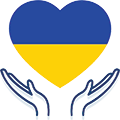The international training for guardians “The system of social norms functioning in the family in relation to the child admitted to foster care”, which took place on May 8-12 in Vilnius, gathered a large target audience from three partner countries.
These trainings were organized for the third time in the international project of the Erasmus+ program ” Conscious Parent Academy – Replacement parent urgently needed!” and every time they include different interesting and relevant topics dedicated for guardians.
This time, the organizer of the training was VšĮ “My Family Academy”, which is one of the four partners institutions. The purpose of partnership is to contribute to the development of the competences of the families of guardians and those intending to become guardians.
The trainings held in Vilnius were aimed at exchange good practices and to deepen the knowledge, as well as to learn new things for foster families from Portuguese, Polish and Lithuanian institutions. Some of the guests visited Lithuania for the first time and were happy to have the opportunity not only to grow in terms of the content of competences, but also to get to know the country’s culture, communicate with locals, visit famous places, and to admire the capital.
It is very gratifying that the participants were engaged, active and curious from the first day of the training.
At the beginning of the training, the representatives of the social services department of the Vilnius city municipality administration presented an interesting report on the organization of child care in Vilnius using informative material (quiz) about the history and culture of the city of Vilnius.
Later, the participants listened to an informative report about the foster care system in Lithuania, which was presented by an expert on the activities of the foster care centers project. Project participants had the opportunity to compare the guardianship system in their countries. Portuguese guardians noticed more differences between the guardianship system, while Polish representatives found many similarities with the system operating in Lithuania. The participants had theoretical and practical training about the family system, the influence of its members on each other, and social norms. They were invited to share their personal experiences and insights.
A lot of attention was paid to researching the situations of the child’s entry into the family. There was a discussion about the arrival of a child in the family: how to help him/her adapt, integrate into the new family culture and become a part of it.
We know that every child has a need to belong to a group. This need is human, and children who end up in foster care often have this need violated. The participants had a practical workshop where they experienced how a child feels in a family with different parenting styles. It was very useful to see the different results and the feelings expressed by the participants.
There were many discussions about the traumatic experiences of children and the possibilities of helping them. The participants received knowledge about the types, symptoms and effects of childhood trauma on the further development and psychology of the child. It is very important to draw the participants’ attention to available resources, so the training was supplemented with a practical part about strengths and how they help to deal with various challenges that arise in everyday life.
We are very happy that the training participants were active, engaged and motivated. Caregivers willingly shared their experiences and insights. This helped other guardians to enrich their knowledge and experience. The success of the training was also contributed by the fact that the participants were guardians with various experiences – from “newbies” who only recently started caring for children, to experienced ones who have already had 98 wards. It was very gratifying to observe the sincere support that the participants expressed to each other.
Those guardians who are new to looking after children received a lot of support, encouragement and motivation. The success of the training was greatly contributed by the Lithuanian partners, who were very involved in the organization of the training. We sincerely thank our partners – Vilnius m. to the municipal administration, which took care of the training facilities.
We would like to thank the Association of Lithuanian Guardians and Adopters, the State Child Rights Protection and Adoption Service under the Ministry of Social Security and Labor, VšĮ SOTAS, LPF SOS Villages Association in Lithuania, who contributed to the organization and implementation of the training. This training showed once again that great results can be achieved in a great team.






